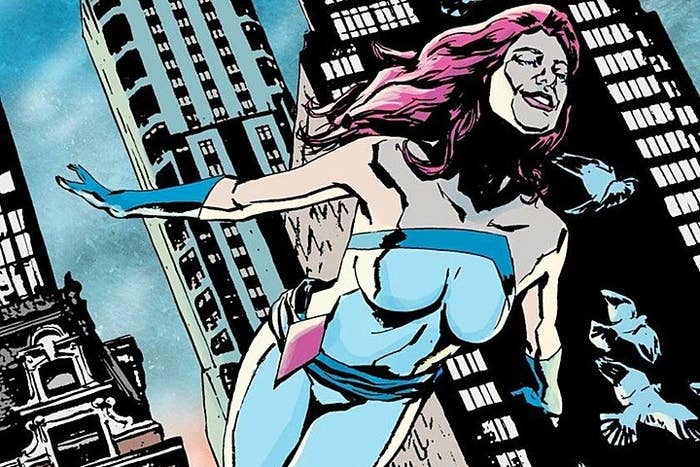“Look, I don’t want to talk about my shitty story, Malcolm. Because there’s always someone who’s had it worse. Someone’s life who was ruined worse.”


“Oh my God. Jessica, I knew you were insecure but that’s just sad. I’m not torturing you. Why would I? I love you,” Kilgrave says.
Meslow expounds, "And if he tells you to kill yourself — well, you'll do that too. Kilgrave is easily the most well-conceived and terrifying villain in Marvel's cinematic universe."
There is a Jessica Jones inside every woman. I was sixteen years old. He was just released from jail at eighteen years old for sexually deviant behavior. Like Jones, I was raped, repeatedly. Like Jones, I resorted to substance abuse to dull the pain. My reluctancy to tell my story revolves around shame. I didn't want pity, nor did I want to convince anyone--including the police, of what happened to me. I existed, mostly, in a world where I felt little comfort or solace.
Stephanie Yang explains how rape culture contributes to domestic abuse in an article for Bitch Media, "Violence is a symptom of a culture that indulges bad behavior as being inherently and unavoidably part of masculinity, or even a romantic expression of desire and protectiveness."
Amer Alzayed remarks in an essay, Rape Culture, "Everyone knows what rape is, but if people do not understand the culture around it and how it [affects] people then it will be extremely difficult to make a change to the culture."
Alzayed defines rape culture as "anything that indirectly or subliminally contributes to a person's willingness to commit rape."
How we dress, talk, drink, etc. are all factors that contribute to our collective beliefs about whether or not rape is excusable behavior. I never had the opportunity to say yes. I cried and begged him to stop. Afterwards, he said, "I think you were molested as a child."
He threatened to kill me and himself if I I left. I was sixteen. He was just released from jail eighteen. He was arrested at thirteen for sexual deviant behavior. When I broke up with him, he said, "I raped your body, mind, and soul and I am happy I did it. And I would do it again."
I struggled for years to communicate my distress. Sometimes we need someone else to tell our story for us. Jessica Jones is the superhero in every woman that has survived sexual assault.
She validated my experience and feelings. Jones sends the message that there is hope for recovery. In an interview with Ritter for Variety, news editor Laura Prudom states:
"I've never seen a show tackle rape culture and issues of consent with this kind of nuance and honesty, and all without feeling the need to show a physical rape scene. It never feels gratuitous and it never feels like pushing an agenda, but it's depressing how subversive that still is on TV these days."
In "The Wiley Blackwell Encyclopedia of Family Studies," Danielle Dirks claims that "decades of research show that acquaintance rape is commonplace in the lives of young women and that it has unique and severe deleterious effects on survivors. Victims hesitate to report because they are fearful of not being believed, suffering reprisal, or experiencing traumatic treatment by medical, criminal justice, or legal officials."
The term "traumatic bonding" refers to the emotional bond between a victim and their abuser. The indications of traumatic bonding involve an imbalance in power. The abuse often occurs sporadically. The victim denies the abuse. Sometimes, the victim dissociates from reality and may experience feeling outside one's body. Another term for this phenomenon is cognitive dissonance–the victim's thought process is affected. Unable to view alternatives, the victim hides the abuse. The bond between a victim and abuser allows a victim to survive within the relationship.
In a study, 'Riding the Bull at Gilley's': Convicted Rapists Describe the Rewards of Rape, published by Oxford University Press on behalf of the Society for the Study of Social Problems, Diana Scully and Joseph Marolla argue "that the popular image of rape, a non-utilitarian act committed by a few "sick" men, is too limited a view of sexual violence because it excludes culture and social structure as pre-disposing factors. Our data come from interviews with 114 convicted, incarcerated rapists." Their studies found that rape was committed by these men for revenge, punishment, sport, adventure, or to gain "access to unwilling or unavailable women" and "power over his victim(s)."
The Rape, Abuse, and Incest National Network estimates that "two-thirds of rapes are not reported to law enforcement officials and conviction rates are low." In a 2014 report conducted by The White House Council on Women and Girls, one in every five women will be raped in her lifetime and one in seventy-one men. A majority of the victims know their offender. Furthermore: "98% of perpetrators are males."
Jessica Jones is the superhero in every woman that has survived sexual assault. Jones sends the message that there is hope for recovery. Claiming an experience by attributing a label to it, i.e rape, doesn't define us; labels help us to identify, to become self aware, stronger, and wiser versions of ourselves. Self-knowledge is a tool for transcendence. If we can identify, than we can heal.

